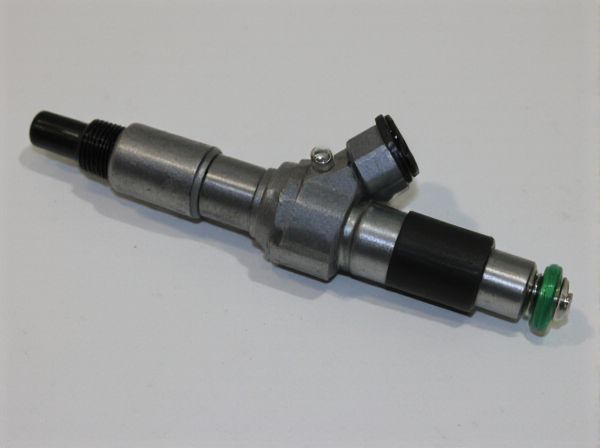
Photo illustration: Hydraulic Injector vs Electronic Injector
Hydraulic injectors rely on fuel pressure and mechanical components to deliver fuel into the engine, offering robustness and simplicity in design. Electronic injectors use precise electrical signals to control fuel delivery, enhancing efficiency and reducing emissions. Your choice depends on the balance between reliability and advanced performance features suited for your vehicle.
Table of Comparison
| Feature | Hydraulic Injector | Electronic Injector |
|---|---|---|
| Operation | Pressure-driven fuel delivery using hydraulic force | Electronically controlled fuel delivery with precise timing |
| Fuel Efficiency | Moderate efficiency due to fixed injection parameters | High efficiency with optimized fuel atomization and timing |
| Control | Mechanical control, limited adjustability | Computer-controlled, adjustable in real-time |
| Emissions | Higher emissions due to less precise injection | Lower emissions with accurate fuel metering |
| Maintenance | Less complex, easier maintenance | More complex, requires diagnostic tools |
| Cost | Lower initial cost | Higher initial cost but better long-term savings |
| Response Time | Slower response to engine demands | Fast response for dynamic engine performance |
Introduction to Fuel Injectors
Fuel injectors are critical components in modern internal combustion engines, responsible for delivering precise amounts of fuel into the combustion chamber. Hydraulic injectors operate using high-pressure fuel and mechanical forces to atomize the fuel, ensuring efficient combustion. Electronic injectors use electronic controls to regulate fuel delivery with greater accuracy, improving engine performance and reducing emissions.
Overview of Hydraulic Injectors
Hydraulic injectors operate by using pressurized fuel delivered through a pump to the injector nozzle, resulting in precise fuel atomization essential for efficient combustion in diesel engines. These injectors rely on mechanical components, such as plungers and delivery valves, to control injection timing and quantity, often enhancing durability in heavy-duty applications. Compared to electronic injectors, hydraulic injectors typically offer simpler design and robust performance but may lack the fine-tuned control and emission optimization provided by electronic systems.
Overview of Electronic Injectors
Electronic injectors utilize advanced electromagnetic solenoids to deliver precise fuel quantities directly into the combustion chamber, optimizing fuel atomization and combustion efficiency. Unlike hydraulic injectors that rely on mechanical pressure from the fuel rail, electronic injectors offer faster response times and improved control over injection timing and duration. This precision contributes to lower emissions, enhanced engine performance, and better fuel economy in modern internal combustion engines.
Key Differences Between Hydraulic and Electronic Injectors
Hydraulic injectors utilize fuel pressure generated by engine oil to operate, offering precise control in diesel engines without reliance on electrical signals, whereas electronic injectors rely on electric solenoids controlled by the engine's ECU for rapid and accurate fuel delivery. Hydraulic injectors are typically more robust and simpler, making them ideal for heavy-duty applications, while electronic injectors provide better fuel efficiency and lower emissions through programmable injection timing and quantity. Key differences also include response time, with electronic injectors delivering faster and more adaptable fueling compared to the mechanically dependent hydraulic system.
Performance Comparison
Hydraulic injectors deliver precise fuel atomization through high-pressure fluid mechanics, resulting in improved combustion efficiency and power output compared to electronic injectors. Electronic injectors offer faster response times and better control over injection timing via advanced electronic control units (ECUs), enhancing fuel economy and reducing emissions. Performance metrics show hydraulic injectors excel in high-load scenarios, while electronic injectors provide greater adaptability across varying engine conditions.
Fuel Efficiency and Emissions
Hydraulic injectors optimize fuel delivery by using high-pressure fluid to atomize fuel, resulting in precise spray patterns that enhance fuel efficiency and reduce unburned hydrocarbons. Electronic injectors offer superior control through programmable solenoid timing, enabling finer fuel metering which improves combustion efficiency and lowers NOx and particulate emissions. Studies show engines equipped with electronic injectors exhibit up to 15% better fuel economy and significantly reduced CO2 emissions compared to hydraulic injector systems.
Maintenance and Durability
Hydraulic injectors generally require more frequent maintenance due to their mechanical complexity and sensitivity to fuel quality, which can lead to wear and clogging over time. Electronic injectors, equipped with advanced sensors and control mechanisms, offer improved durability and more precise fuel delivery, reducing the likelihood of component failure and extending service intervals. The enhanced diagnostics capabilities of electronic injectors simplify troubleshooting and maintenance, resulting in lower long-term operational costs.
Cost Considerations
Hydraulic injectors generally have lower upfront costs due to simpler design and construction, making them more affordable for basic applications. Electronic injectors, while more expensive initially, offer improved fuel efficiency and reduced emissions that can lead to long-term savings on fuel and maintenance. Evaluating Total Cost of Ownership (TCO) is crucial, as electronic injectors may provide better economic value through enhanced performance and compliance with environmental regulations.
Application and Industry Usage
Hydraulic injectors are predominantly used in heavy-duty diesel engines across industries such as construction, marine, and agriculture due to their durability and high-pressure fuel delivery capabilities. Electronic injectors find extensive application in automotive, aerospace, and precision machinery sectors where precise fuel control, efficiency, and emissions compliance are critical. The choice between hydraulic and electronic injectors depends on factors like engine type, required fuel injection accuracy, and industry-specific performance standards.
Choosing the Right Injector for Your Needs
Selecting the right injector depends on your vehicle's performance requirements and fuel efficiency goals. Hydraulic injectors offer robust durability and simpler mechanics, making them ideal for heavy-duty applications and cost-sensitive maintenance. Electronic injectors provide precise fuel delivery and better emission control, suited for modern engines demanding optimal performance and environmental compliance.
 caratoz.com
caratoz.com